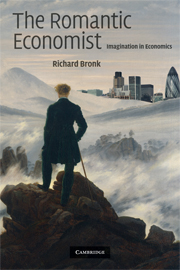Book contents
- Frontmatter
- Dedication
- Epigraph
- Contents
- Preface
- Acknowledgements
- 1 Preface to The Romantic Economist
- PART I THE PRELUDE: THE ROMANTIC ECONOMIST AND THE HISTORY OF IDEAS
- PART II Fragments of Unity: Romantic Economics in Practice
- 5 Using organic metaphors in economics
- 6 Economics and the nation state
- 7 Incommensurable values
- 8 Imagination and creativity in markets
- 9 Homo romanticus and other homines
- 10 Imagination and perspective in economics
- 11 The Romantic Economist: conclusion
- Notes
- Bibliography
- Index
7 - Incommensurable values
Published online by Cambridge University Press: 05 March 2015
- Frontmatter
- Dedication
- Epigraph
- Contents
- Preface
- Acknowledgements
- 1 Preface to The Romantic Economist
- PART I THE PRELUDE: THE ROMANTIC ECONOMIST AND THE HISTORY OF IDEAS
- PART II Fragments of Unity: Romantic Economics in Practice
- 5 Using organic metaphors in economics
- 6 Economics and the nation state
- 7 Incommensurable values
- 8 Imagination and creativity in markets
- 9 Homo romanticus and other homines
- 10 Imagination and perspective in economics
- 11 The Romantic Economist: conclusion
- Notes
- Bibliography
- Index
Summary
NO SINGLE SCALE OF VALUE
One of the great debates in moral philosophy is between value pluralists and value monists. Pluralists believe that rival values are often inherently plural and incommensurable; by this, they mean that different values cannot be derived from a single self-consistent and universal system of principles (or from some single objective essence of the good), and cannot be compared with one another according to a single scale of ultimate value. As a result, pluralists argue that there is no one right answer as to how we should live our lives. By contrast, monists believe that value conflicts — for example, between equality and liberty or between natural beauty and economic efficiency — can be fully resolved by recourse either to a unique set of foundational principles or to the touchstone of one ultimate value. Utilitarianism is an example of a monist ethical doctrine, since it purports to provide a common currency for moral judgements, and one that can be used to solve all moral dilemmas. It aims to decide between the rival claims of alternative courses of action by weighing their consequences according to the scale of utility. In other words, it renders the consequences of alternative scenarios commensurable (that is, comparable with one another) in a single unit of account. For the most part, the Romantics railed against utilitarianism, and many of them instead supported (often inadvertently) a value-pluralist outlook.
- Type
- Chapter
- Information
- The Romantic EconomistImagination in Economics, pp. 172 - 195Publisher: Cambridge University PressPrint publication year: 2009

